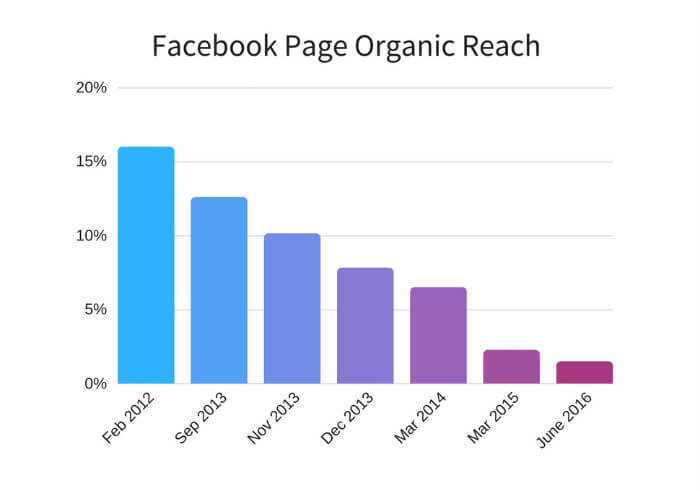
What the Law of Low Conversion Rate teaches us about Marketing
Follow Us @
What the Law of Low Conversion Rate teaches us about Marketing
-Trending Marketing news, content marketing, latest Ways to rank your website, marketing discoveries, Local SEO, seo and social media marketing services. enjoy your stay on our website.
My favorite movie about marketing is “Message for you”with Tom Hanks and Meg Ryan.
The film teaches one of the most important marketing lessons I've had: what happens when implementation speed reaches the Law of Low Conversion Rate.
All you need to know about the film is this: in 1998 people were lively to receive email.
Marketers who were using email marketing in 1998 were seeing 90% CTR, click-through rate, the number of people clicking on links in their emails. The average CTR today is around 3%, a 3000% drop in rate. A CTR of 10% today is considered exceptional.
The slow but steady decline in click-through rates happens across all marketing channels.
The first ad ever, on HotWired.com in 1994, had a 78% conversion rate. The average banner ad today is 0.17%, a drop of 45800% (I typed it right).
The cost of advertising on Google Adwords has risen every year since the platform began, and the conversion rate has fallen almost proportionately. The same thing with Facebook Ads.
It's not just the paid advertising market, it's all marketing channels. Organic reach on Facebook has been dropping steadily, without pause.

This phenomenon is known as The Law of Low Conversion Rate: Over time, all marketing strategies result in low conversion rates.
The implication is that the benefits of a new channel go to those who optimize for just one thing: speed of implementation. People who move fast and are disruptive win.
If you gave me the choice between having the best email marketer in the world write my emails today or having an eleven year old write them, but she goes back in a time machine and gets the conversion rates of 1998, I would choose the eleven year old without thinking twice.
Because those who are fast have
Implementation speed alone sometimes matters more than any other factors combined. This is something I've been noticing in myself, my clients, and my friends – but it's not intuitive as to why.
The shortest answer to this impact is compound interest.
Compound Interest and Implementation Speed
Let's do a little experiment. Take two people and say that one of them is just a little faster at adopting the new marketing strategy than the other. Keep all other factors the same.
Person 1, let's call him Zuck in honor of Mark Zuckerberg and his “move fast and be disruptive” law. Zuck adopts the new marketing channel when the CTR is at 20%.
Person 2, let's call him Henryadopts the new channel when the CTR is already at 10%.
You would expect person 1 to do better, but how much better? 20% is twice as much as 10%, so you would think Zuck would end up performing twice as well.
That was my first intuition, but let's see what happens.
If they go through 10 marketing channels each and both start with $1,000, then Zuck would end up with a 2.68x better return than Henry. We call this number (2.68) Zuck's premium speed.
It's the advantage he gains from being faster than Henry.
Zuck = R$7.268
Henry = R$2.707
Zuck Premium Speed = 268%
This is a little better than we expected. Let's keep the experiment running through a few more channels.
Wow! That's a little more than you'd expect! What happened?
Compound interest is what happened. As you add more and more layers, the premium speed becomes enormous.
There's a reason why the CEO of Cimbinator, Sam Altmansays: The best founders seem to be quick at everything.
I can't think of any other factor that correlates more strongly with a company's growth than the speed of implementation that I've seen.
Why do most people move slowly when speed of implementation is so important?
The reason why most people don't implement in an agile way is because of a natural psychological factor called loss aversion.
The best way to understand loss aversion is to imagine someone offering you a game with 50/50 odds. You flip a coin, heads you win, tails you lose.
But with one detail: the minimum bet is R$5,000.
What is the lowest amount you would accept to participate in the bet? Would you enter for odds a little better than 50/50? Heads you win R$6,000 and tails you lose R$5,000?
Or would the payment have to be better? If heads win, you win R$10,000, but tails you lose R$5,000, would you do it?
In several experiments researchers have found that participants usually do not participate for less than 2-2.5x; that is, you have at least a 50% chance of losing R$5,000 and winning R$10,000.
This is clearly irrational, so why do we do it?
It is part of our evolutionary heritage. In a life or death situation, you should be risk averse.
If you were walking through the African savannah, heard a bush move and estimated that there was a 95% chance it was a good meal, but a 5% chance it was a lion, your ancestors would run.
Those who didn't run were left out of the gene race because they became lion food.
The correct way to think about this is in terms of Possible Losses.
Possible Losses only means “can you pay to see it?”. In the savannah, you can't. In terms of marketing structures, you can.
If you're wrong and only spend a few hundred dollars on a new marketing tool, it doesn't kill you. If you do this systematically, you will end up with premium speed just like Zuck.
What marketing strategy do you believe few people do?
What's the best scientific way to find a new marketing channel that will reward you?
It is an adaptation of Peter Thiel's investment method for finding innovative startups: which marketing channel Do you believe it will be huge and few other people apply it?
This is usually a problem of courage. The hardest part about email marketing in 1998 wasn't sending an email, it was having the courage to invest in the internet when Newsweek was calling it future failure.
Mark Manson, a popular blogger, started doing Facebook marketing in 2013 when many people called it a future failure. The joke is on the people who disbelieved him while his book sales, made primarily through Facebook traffic, made him a New York Times bestselling author.
Speed of implementation applies to almost everything
The reason premium speed is important is because most domains offer the same behavior as marketing. They follow the Low Conversion Rate Law.
Wherever I give career tips to people, the first thing I tell them is to start by promoting their work and increasing their audience.
Often the answer I get is “well, not everyone can make a hearing. How is everyone going to have hundreds or thousands of people following their work?”
They can not! But that doesn't mean you can't do it.
There is always a window of opportunity for something. If you wanted to start a corporate bank, you missed that window. The time was 100 years ago when JP Morgan started.
Could everyone have done this? No way. But that didn't stop Morgan. Now I look out my window toward Manhattan and see a 52-story building on Park Avenue with JP's name on it.
Not everyone could start a steel company or an oil company, but Carnegie and Rockefeller were too busy making money to notice.
If you want to start an internet business, now is a good time. In 100 years, the internet will not be a good place to start a company.
That's a good reason to start now and not wait any longer.
Speed is a muscle and you can train it
Learning to move fast is like getting stronger.
To get strong, you have to lift a little more weight than the last time you went to the gym. If you lifted 20 kilos the previous week, this week you lift 25, the next 30 and so on.
If you don't add more weight, you never get stronger.
If you add too much weight, too fast, you hurt yourself.
If you add weight gradually but consistently, you get stronger.
A good rule of thumb is that the amount of weight you lift should always leave you a little uncomfortable.
If you're not a little nervous before picking up the weight, you're too light.
If you're terrified and think you're going to hurt yourself, you're probably too heavy.
Likewise, you always want to move fast enough to be a little out of control.
Not so fast that you lose control and hurt yourself, but enough that you feel uncomfortable about the changes.
Speed is a muscle. Train him.
For more articles like this, visit the portal.
What the Law of Low Conversion Rate teaches us about Marketing
Follow TODAYSGIST on Google News and receive alerts for the main trending SEO news, Ai news, latest Ways to rank your website, marketing discoveries, Local SEO and lots more!
What the Law of Low Conversion Rate teaches us about Marketing
SHARE POST AND EARN REWARDS:
Did you like this post?!!! Join our Audience reward campaign and make money reading articles, shares, likes and comment >> Join reward Program
FIRST TIME REACTIONS:
What the Law of Low Conversion Rate teaches us about Marketing
Be the first to leave us a comment, down the comment section. click allow to follow this topic and get firsthand daily updates.
JOIN US ON OUR SOCIAL MEDIA: << FACEBOOK >> | << WHATSAPP >> | << TELEGRAM >> | << TWITTER >
What the Law of Low Conversion Rate teaches us about Marketing
#Law #Conversion #Rate #teaches #Marketing
-

 usa today entertainment3 months ago
usa today entertainment3 months agoRed Eye (TV series 2024) Download Mp4 ▷ Todaysgist
-

 usa today entertainment3 months ago
usa today entertainment3 months agoLuxe Listings Toronto (TV series) Download Mp4 ▷ Todaysgist
-

 Cryptocurrency3 months ago
Cryptocurrency3 months agoPerpetrator Laundering Money Using Crypto Worth IDR 3.7 Trillion Caught in Hong Kong
-

 usa today entertainment3 months ago
usa today entertainment3 months agoHYBE Confirms There Was an Attempted Rebellion at ADOR, Says Gibah Min Hee Jin with Other Agency Officials
-

 Sports3 months ago
Sports3 months agoThe schedule for the rematch against Udinese is not favorable for AS Roma
-

 usa today entertainment3 months ago
usa today entertainment3 months agoMasterChef Junior (TV series) Download Mp4 ▷ Todaysgist
-

 usa today entertainment3 months ago
usa today entertainment3 months agoBrigands The Quest For Gold (2024) (Italian) (TV series) Download Mp4 ▷ Todaysgist
-

 Cryptocurrency3 months ago
Cryptocurrency3 months agoToday's Crypto Prices 30 April 2024: Bitcoin CS is on fire again


























